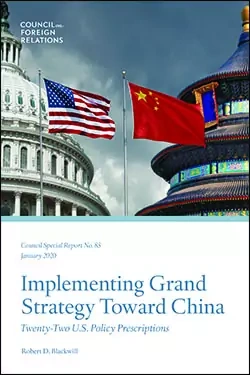
Implementing Grand Strategy Toward China
Twenty-Two U.S. Policy Prescriptions

The Trump administration recognizes the China challenge, but it needs a grand strategy. Blackwill recommends decisive action, sustained diplomacy, collaboration among branches of the U.S. government, and working with allies in Asia and Europe, among other approaches.
- Council Special Report
- Concise policy briefs that provide timely responses to developing crises or contributions to current policy dilemmas.
“China wants to replace the United States as the strongest and most influential power in Asia and beyond,” warns Council on Foreign Relations (CFR) Henry A. Kissinger Senior Fellow for U.S. Foreign Policy Robert D. Blackwill. “Washington should launch an all-out effort to limit the dangers that Beijing’s economic, diplomatic, technological, and military expansion pose to U.S. interests in Asia and globally,” he writes.
To more effectively compete with China, Blackwill offers proposals starting with modernizing U.S. domestic infrastructure, improving education, and harnessing next-generation technologies. On the foreign policy front, Blackwill recommends spending fewer resources on the Middle East, deepening ties with allies in Asia and Europe, shifting military assets to Asia, and seeking a more constructive relationship with Russia.
More on:
“Although the Trump administration is the first to recognize the failed policies of the past toward China, it has developed no such grand strategy toward the country, and thus no integrated and detailed work plan. This puts the United States at a major strategic disadvantage because China does have a grand strategy,” writes Blackwill.
On ratcheting up tensions between the United States and China, the author warns, “If both foolishly continue to actively seek primacy in the Indo-Pacific, few consequential compromises will be advanced or accepted by Washington or Beijing. With little or no willingness by either side to take the other’s vital national interests into account, the road opens to sustained confrontation and perhaps even, in extremis, military conflict.”
“However, such a dangerous outcome is far from inevitable,” Blackwill writes. “Washington and Beijing, through sustained diplomacy, can manage this enduring policy contention in ways that avoid perpetual confrontation. This would require thoughtful and prudent statecraft in both capitals, which is now not the case.”
Such statecraft would advance the following goals for both the United States and China:
- “Reach broad understanding over what constitutes their respective vital national interests;”
- “Construct off-ramps through diplomacy to avert confrontations over mutually incompatible vital national interests;”
- Avoid making minor issues tests of national strength and prestige, and compromise on lower-priority issues where possible;
- “Muzzle inflamed government public rhetoric regarding the policies and actions of the other;”
- “Search for areas to cooperate intensively on global governance, such as climate change, the world economy, and nonproliferation;”
- “Accept that for the foreseeable future the United States and China will have incompatible political systems and two fundamentally opposed concepts about the sources of political legitimacy and how best to organize societies;” and
- “Reject regime change as a policy objective in word and deed.”
More on:
Professors: To request an exam copy, contact [email protected]. Please include your university and course name.
Bookstores: To order bulk copies, please contact Ingram. Visit https://ipage.ingramcontent.com, call 800.937.8200, or email [email protected]. Include ISBN: 978-0-87609-786-1.
 Online Store
Online Store